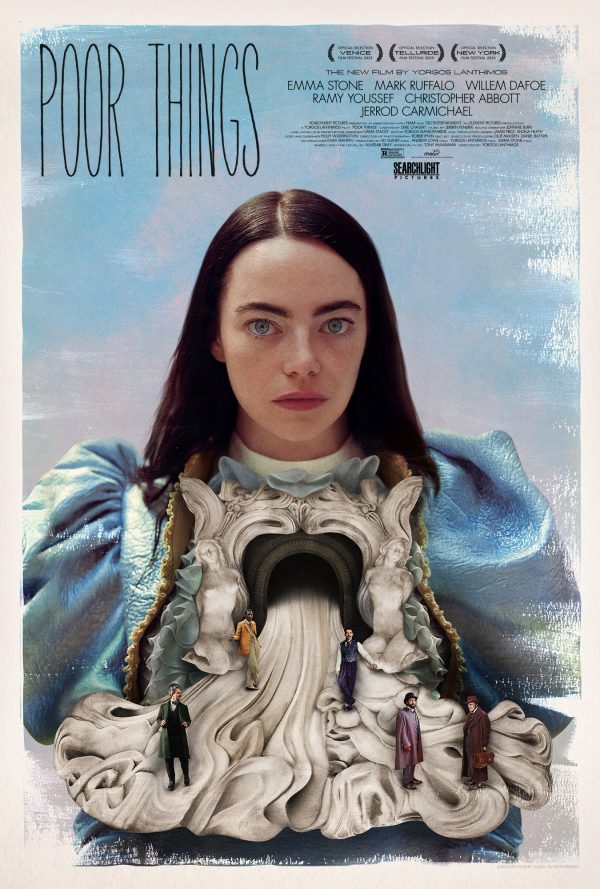
“Poor Things” (2023). Cast: Emma Stone, Mark Ruffalo, Willem Dafoe, Ramy Youssef, Christopher Abbott, Jerrod Carmichael, Hanna Schygulla, Kathryn Hunter, Vicki Pepperdine, Margaret Qualley, Suzy Bemba. Director: Yorgos Lanthimos. Screenplay: Tony McNamara. Book: Alasdair Gray, Poor Things. Web site. Trailer.
While strolling through London one day, the doctor came upon an apparent suicide victim floating in the Thames at the base of one of the city’s bridges. He found the young, anonymous pregnant woman near death. She appeared to have no brain function, but her vital signs were clinging to life, a condition he believed he could work with in saving her from passing. His plan? Dr. Baxter decided to perform a brain transplant, removing the undamaged organ from the woman’s unborn child and placing it in the mother’s skull, subsequently enlivening it with a device to reanimate the victim.
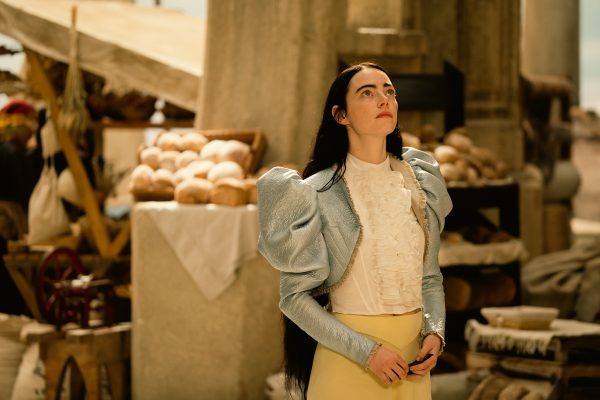
As it turns out, the procedure worked, and thus Bella Baxter (Emma Stone) was “born.” There was just one hitch – even though Bella possessed the body of a full-grown woman, she had the brain of an infant. This combination left the doctor’s latest “creation” with a dearth of language and motor skills, as well as a fundamental lack of maturity and virtually no understanding of the wider world, conditions exacerbated by her existence being restricted to Baxter’s home. He was eager to see her grow and develop, but progress was decidedly slow. What was he to do?
As the film opens, the doctor comes to the conclusion that he might be able to further her development by compiling data about her skills, abilities and learning curve. But such an ambitious undertaking would require assistance, so he hires one of his students, Max McCandles (Ramy Youssef), to collect the information. When Max learns about the true nature of the task, though, he’s stunned. He’s both appalled and intrigued by what he finds, but he has trouble withdrawing from the assignment when he begins developing an attraction for his subject.
Bella’s progress initially continues slowly, even with Max’s observation and guidance. But the pacing accelerates markedly when she makes a discovery that astonishes her – an awareness of her own sexuality. It triggers something in her, prompting rapid advances in cognition, articulation and creativity. It also gives her tremendous pleasure, and that sense of arousal makes her ever more attractive to the young med student.
Godwin – whom Bella now calls “God” – notices the attraction between Bella and Max, even going so far as to suggest that they wed, provided they both agree to live in his home as Bella’s personal development continues. Despite the fact that she has made some progress, the doctor doesn’t believe she’s ready to venture out into the real world yet, even with Max to guide her. So, to ensure that his wishes are complied with in this venture, Baxter hires an attorney, Duncan Wedderburn (Mark Ruffalo), to draw up a contract spelling out the terms.
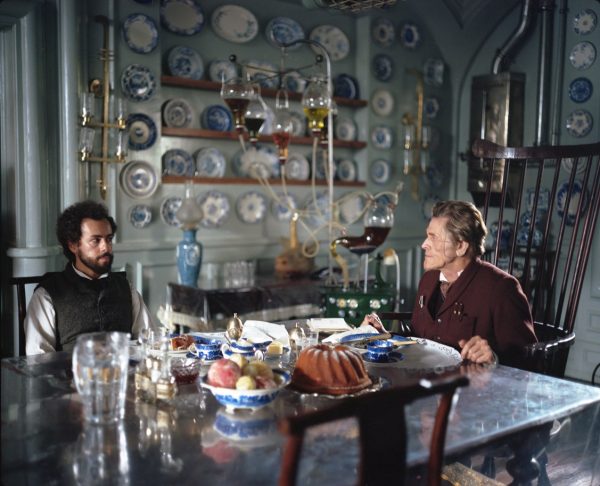
But, just as matters seem to be falling into place, the arrival of the unscrupulous lawyer changes everything. Mr. Wedderburn, it seems, is quite a lusty, oily lech, taking an obsessive liking to Bella, who willingly returns those feelings in kind now that she’s discovered the libidinal side of her life. Bella and Duncan experience an explosion or carnal passion, and she readily accepts his invitation to join him on a trip to Lisbon. She promises Max that she’s still committed to him but that she wants an adventure in the real world before settling down with him for good. And, despite efforts by Godwin and Max to prevent her from leaving, she takes off with Duncan anyway.
Once free from her life of seclusion, Bella blossoms like a flower. She begins discovering her true self, growing ever wiser, more observant and more uninhibited in expressing herself and her singular view of the world. Unfortunately for Duncan, Bella’s growing sense of independence causes him frustration and distress he wasn’t prepared for. She wears him out sexually. She behaves in ways he finds embarrassing, particularly in public and in the company of others. And she frequently goes on unannounced adventures, leaving him alone and wondering where she is.
To rein Bella in, Duncan decides to book passage for the two of them on a Mediterranean cruise, believing that being aboard ship will keep her from straying. But this strategy backfires; she meets new and interesting people, such as Harry (Jerrod Carmichael) and Martha (Hanna Schygulla), an alternative couple who broaden Bella’s horizons, introduce her to philosophy and encourage her not to give in to the conventions of society, all of which nudge her further along her own path of personal exploration – and further away from Duncan.
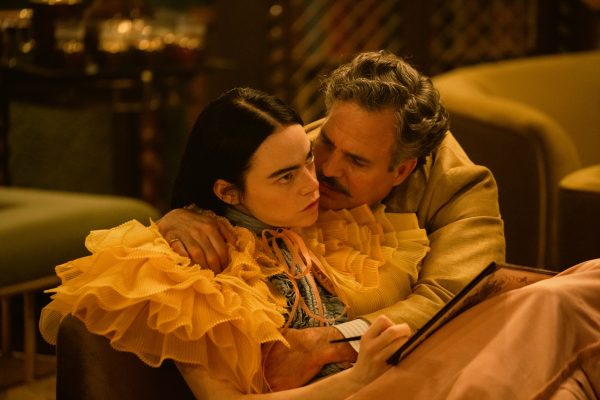
But where will all this lead? What will happen to Bella’s relationship (such as it is) with Duncan? And what will become of Godwin and Max back in London as their subject continues to roam about freely on her own? Is Bella’s experience something to be concerned about or celebrated? Indeed, will Dr. Baxter’s “experiment” prove to be a failure or a success beyond his wildest dreams? That all remains to be seen as this remarkable odyssey plays out.
Bella’s experience in working with her emerging beliefs is, admittedly, something of an exercise in trial and error. Some initiatives work, while others need to be revamped. But what’s most impressive is that, like the innate nature of her overall self, she’s not afraid to experiment, to try out new things to see where they take her, all in the belief that the experiences will ultimately serve her well as she hones the path she wants to pursue, no matter how unconventional some of her notions may seem. This is a perspective that would likely prove valuable to anyone seeking to retool, even if matters take some time to sort out and refine. In this regard, Bella essentially becomes an unlikely teacher for all of us in this regard.
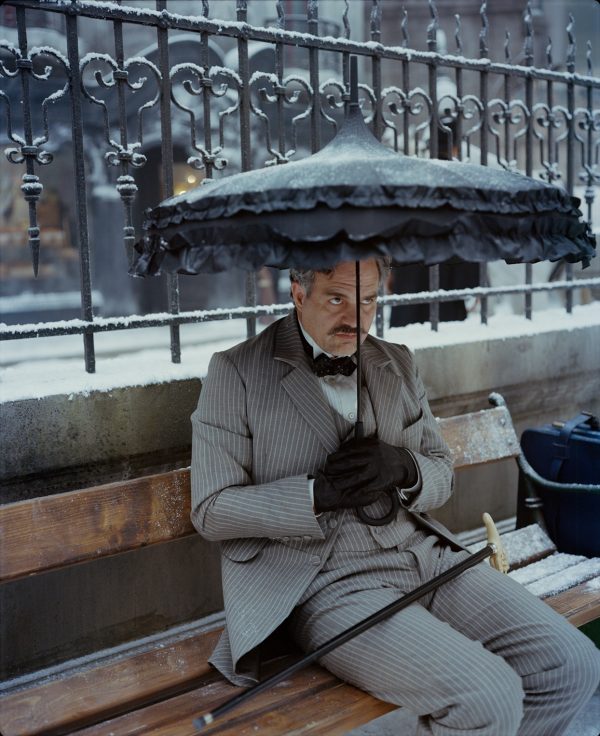
I find it intriguing that her greatest growth spurts come about as a result of her discovery of her own sexuality. Some may find this strange or unduly provocative, yet it really shouldn’t come as a surprise to any of us when we think about the underlying nature of one’s erotic side. Sexuality, at its core, is an inherently creative act, one designed to give us pleasure, new experiences, and, perhaps eventually, the creation of new life. Even if some or all of these are not the desired intent, the practice of exploring this part of ourselves could (and, in fact, often does) inspire us to pursue our overall capacity for creativity, regardless of the particular areas of our lives in which it’s employed. It can potentially encompass everything from the creation of artistic works to the way we live our lives and everything in between. What matters most, though, is that we freely exercise this aspect of ourselves as intrinsically creative beings in the exploration and/or reinvention of our existence, no matter what aspect of reality we may choose to investigate.
Bella is not the only one who engages in this endeavor, either. The same could be said, for example, of the good doctor, whose experiments – while not for everyone – embody the notion of belief-driven creative exploration. Max, in his own way, follows suit, as he comes out of his shell and begins adopting a more open-minded approach to his life, his career and his capacity for romance. And, of course, similar outlooks are more than apparent in the lives of Harry, Martha, Mme. Swiney and Toinette, all of whom are not afraid to chart their own courses with their own brands of creativity and singular insights. Given these charismatic influences, it’s easy to see why Bella is so drawn to them and away from those – like Duncan and his friends – who are more innately conventional in their mindsets, expectations and lifestyles.
While the creative exploration of our beliefs and personal selves should be of paramount importance to us under any circumstances, it’s particularly crucial in this story in light of its historic time frame and the individuals involved. The Victorian Era was not especially welcoming to innovative thoughts and deeds, nor was it particularly accommodating to women. In an age where men ruled virtually everything and women were typically treated more like property than people, Bella’s determined, almost defiant acts of finding herself, exploring her individuality, and, accordingly, openly expressing her true being are remarkably courageous and inspiring undertakings to be commended. One could hope that the example she set would rub off on others, too, setting the stage for them to follow in her footsteps as reinvented, empowered individuals. That’s especially true for women eager to unapologetically be themselves, those who are unwilling to capitulate to others and refuse to be relegated to the status of “poor things.”
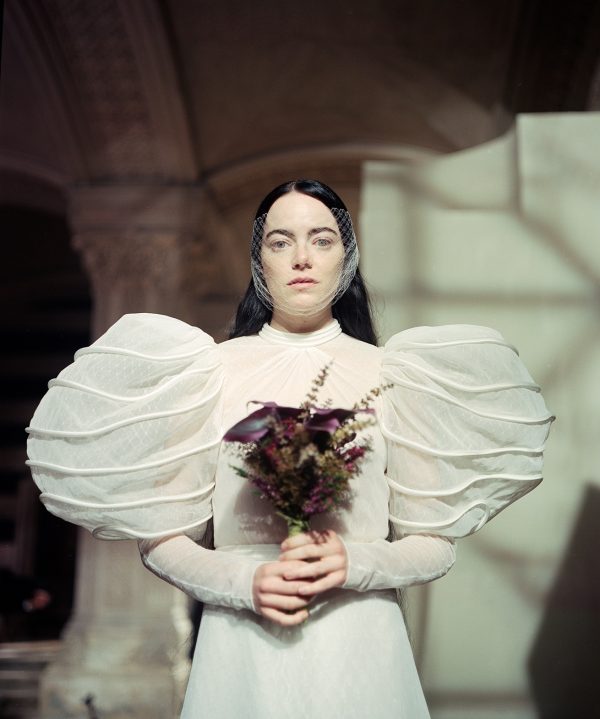
The process of reinvention is something that happens both literally and metaphorically in this latest offering from director Yorgos Lanthimos. But the way that result comes about here represents a truly inspired fusion of genres, including comedy, romance, social commentary and sci-fi, making for one of the most inventive, unusual and hilarious releases of recent years. This offbeat feminist fable, based on Alasdair Gray’s 1992 novel of the same name, pushes the envelope of convention, exposing viewers to a wide range of ideas and outlooks for fulfilling the aforementioned goal and serving it up with hefty doses of absurdist humor. While the film’s pacing could use some shoring up in the middle, this offering nevertheless entertains with alternative insights and uproarious laughs throughout, even when the narrative turns more thoughtful and substantive. The superb performances by Stone, Dafoe and Ruffalo are undeniably top shelf, all of them earning well-deserved awards season accolades, with more undoubtedly to come. The film is also visually stunning in its cinematography and editing, as well as in its spectacular and whimsical production design, filled with vibrant images reminiscent of the movies of Wes Anderson and Terry Gilliam while sustaining a look all its own. Admittedly, this release features a good deal of explicit sexuality, both visually and in the dialogue, so sensitive and easily offended viewers should take note. However, as one of the most anticipated pictures of this year’s awards season, “Poor Things” never disappoints, serving up a solid offering that consistently tickles the funny bone while giving audiences much to think about – and there’s nothing poor in any of that.
For its efforts, “Poor Things” has earned seven Golden Globe Award nominations for best picture (musical or comedy), director, actress (musical or comedy) (Stone), supporting actor (Ruffalo and Dafoe), screenplay and original score. On top of that, the film has also captured a whopping 13 Critics Choice Award nominations for best picture, comedy picture, director, actress (Stone), supporting actor (Ruffalo), adapted screenplay, cinematography, editing, production design, original score, visual effects, costume design, and hair and makeup. In addition, this release has garnered three honors from the National Board of Review for best supporting actor (Ruffalo) and adapted screenplay, as well as one of the year’s Top 10 Films. “Poor Things” is currently playing theatrically in general release.
Copyright © 2023, by Brent Marchant. All rights reserved.

No comments:
Post a Comment